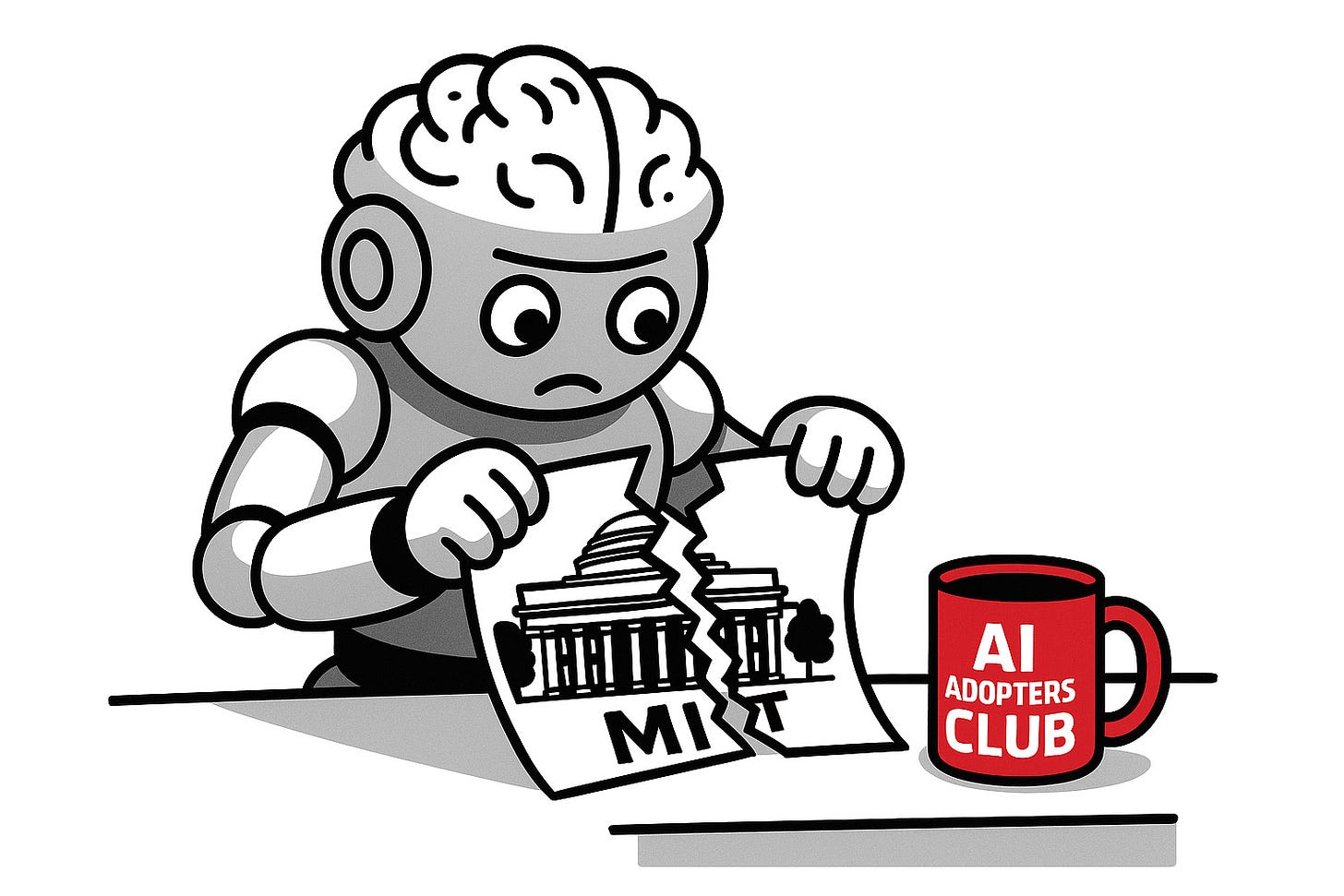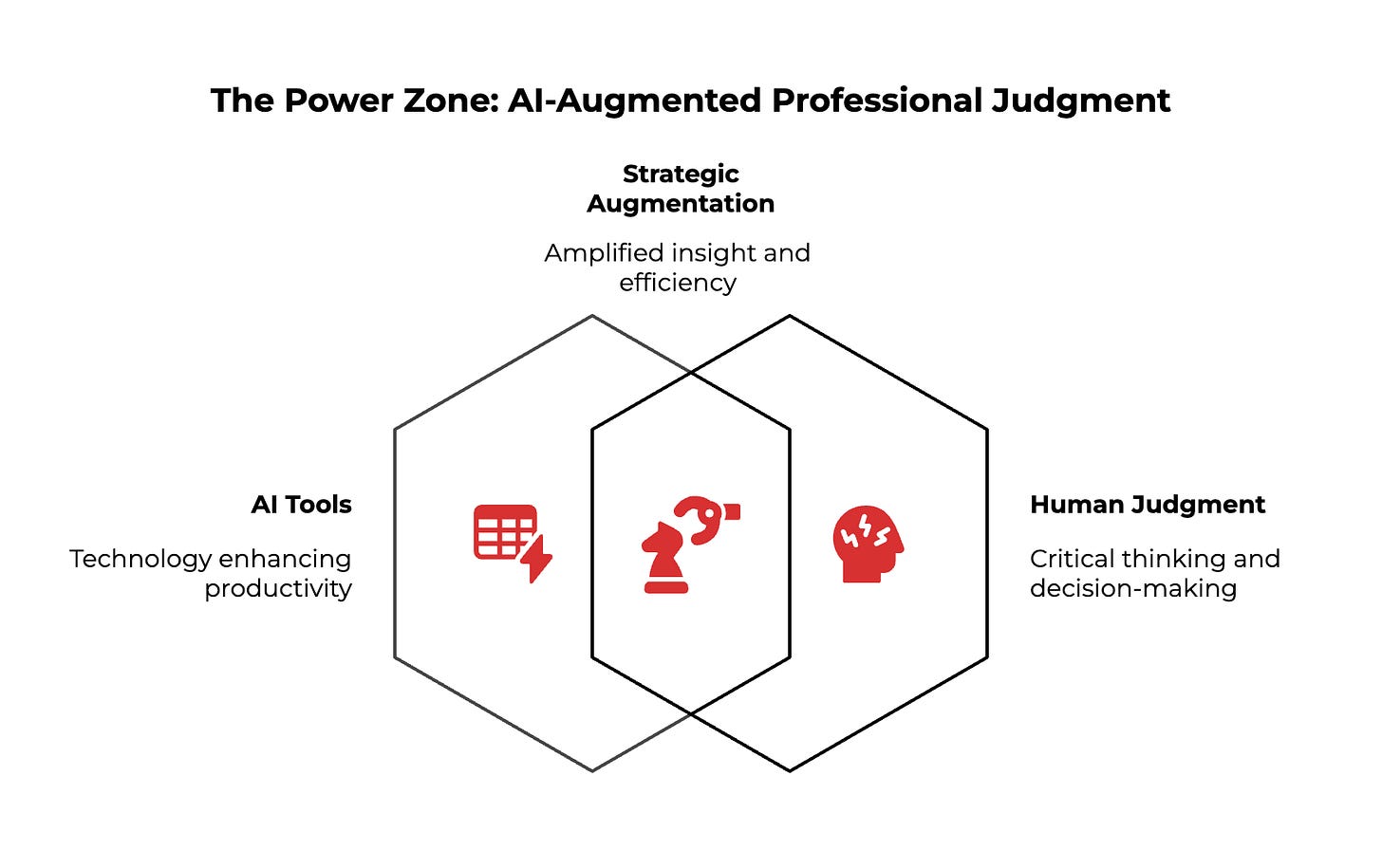How to Use AI Without Getting Dumber (My Opinion)
Why The MIT ChatGPT Study Misses the Point Entirely
Hey Adopter,
Everyone's freaking out about the MIT study showing ChatGPT "rots your brain." Headlines scream about cognitive decline and neural disengagement. Business leaders are second-guessing their AI strategies. Consultants are worried about recommending tools that supposedly make people dumber.
Here's the problem: this study is completely irrelevant to how professionals should use AI.
The Research Actually Proves Nothing About Work
The MIT researchers had students write SAT-style essays while wearing EEG headsets. They found that students using ChatGPT showed "weaker neural engagement" and couldn't remember what they'd written.
Shocking revelation: if you let a machine do your thinking for you, you do less thinking.
This is like studying people who use GPS to navigate and concluding that maps make you geographically stupid. Of course they do, if you never learn to read them properly.
But here's what the researchers missed entirely: professional work isn't essay writing, and business value isn't measured by your ability to remember every sentence you produced.
The Wrong Question About Brain Power
The study obsesses over whether people can recall the exact words they wrote. In what business context does this matter?
When you use AI to draft a client proposal, do you need to memorize every phrase? When you generate multiple strategic options for a project, is word-for-word recall the success metric?
The researchers are measuring the wrong thing entirely. They're treating AI like a crutch when it should be treated like a power tool.
What Actually Matters for Professionals
Smart professionals don't use ChatGPT to replace thinking. They use it to think more creatively and efficiently.
The consultant who uses AI to rapidly prototype five different client presentation structures isn't getting dumber. They're exploring more possibilities than they could manually generate.
The manager who uses AI to analyze meeting notes and extract action items isn't losing cognitive ability. They're freeing mental bandwidth for strategic decisions.
The key difference: these professionals are using AI as input for their judgment, not as a replacement for it.
The Real Risk Nobody's Talking About
The actual threat isn't brain rot. It's bad implementation.
Most organizations are rolling out AI tools without teaching people how to use them strategically. They hand employees ChatGPT access and expect magic. When results disappoint, they blame the technology.
This creates the exact scenario the MIT study documented: people defaulting to AI for tasks they should handle themselves, then wondering why the output feels hollow.
How to Use AI Without Getting Dumber
The solution isn't avoiding AI. It's using it intentionally.
Start with your own thinking, then use AI to expand it. Draft your initial approach before asking for alternatives. Define your criteria before generating options.
For consultants: don't let AI write your proposals. Use it to stress-test your recommendations and identify gaps in your logic.
For managers: don't let AI make your decisions. Use it to surface considerations you might have missed and model different scenarios.
The goal is cognitive enhancement, not cognitive replacement.
The Bigger Picture for Business Leaders
Organizations that ban or limit AI usage because of studies like this will fall behind competitors who implement it thoughtfully.
The MIT research should prompt better AI training, not AI avoidance. Teach people to use these tools as thinking partners, not thinking replacements.
The companies that figure this out first will have teams that can analyze faster, prototype quicker, and explore more thoroughly than their competitors.
That's not cognitive decline. That's a competitive advantage.
“The MIT study proves that if you use AI as a crutch, you'll get weaker. But they never tested using it as a power tool. The problem isn't that ChatGPT rots your brain; it's that most people are using it to replace thinking instead of enhance it."
Adapt & Create,
Kamil








I struggle with brain fog due to a chronic illness. I also struggle with how people might judge me for using ChatGPT as a thought partner. At this point in my work, I've decided that my creative and productive output is worth any criticism. I use AI the way you've described it here, and I find it levels the playing field for me. I no longer feel hampered by my illness, as AI has aptly streamlined access to the areas of my brain that have proven difficult to reach these last few years. I am personally grateful for this powerful tool and fully intend to leverage its usefulness in harnessing my personal genius. Thank you for this important framing.
I do feel we’re heading into a world where educators need to rethink the way that they teach students how to engage effectively - to enhance their learning. If anything, a values-based approach to learning rather than a results based approach will reward students more. Teaching them curiosity and the value of learning as a practice rather than emphasising the outputs will put them into the right mindset to engage with AI tools. The student who asks the right questions will always find the right answers to what they want. AI will just help them get there quicker.